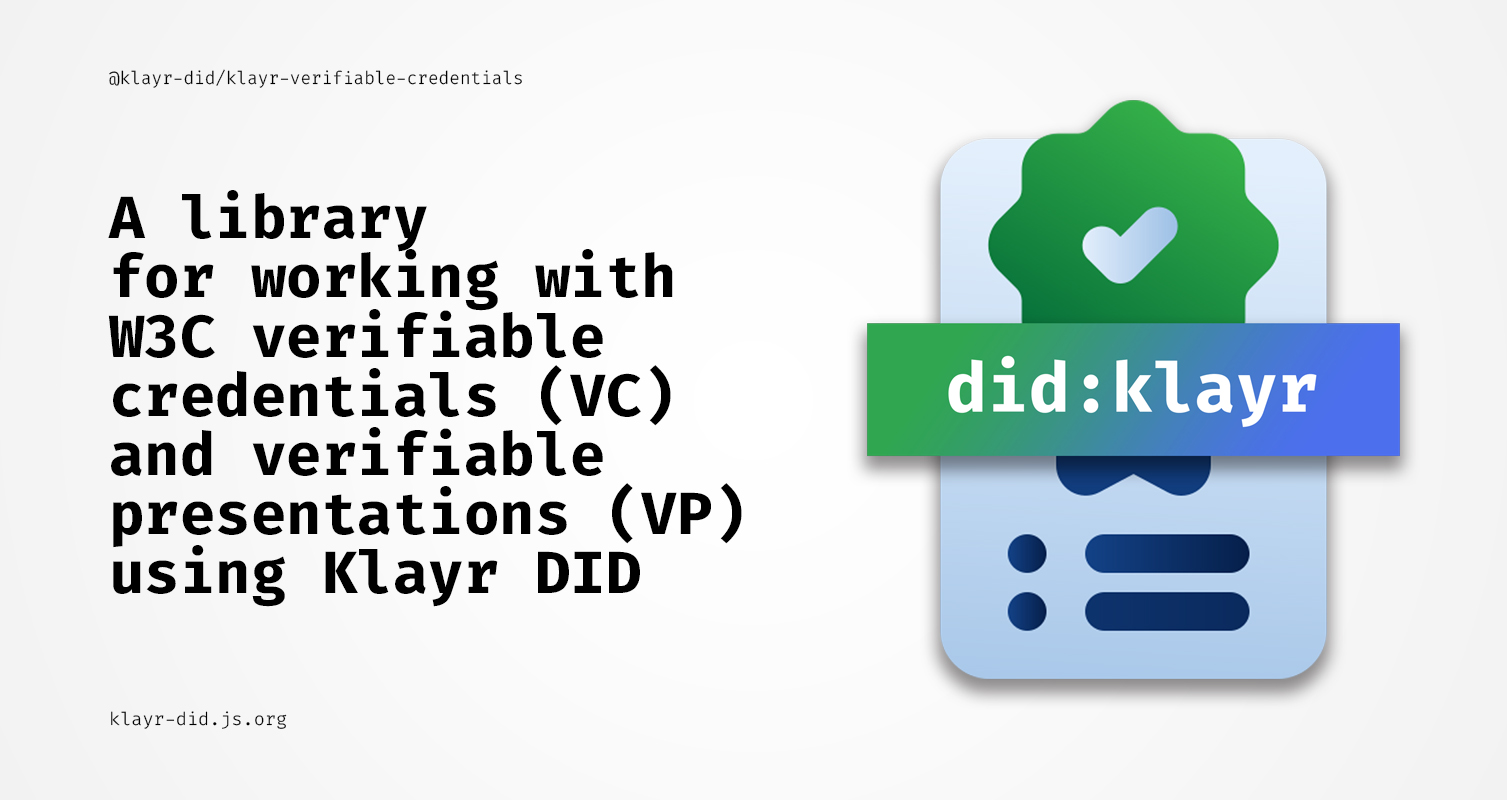@klayr-did/klayr-verifiable-credentials
v0.2.6
Published
A library for working with W3C verifiable credentials (VC) and verifiable presentations (VP) using Klayr DID
Downloads
2
Maintainers
Readme

@klayr-did/klayr-verifiable-credentials
A library for working with Verifiable Credentials (VC) and verifiable presentations (VP) using Klayr DID method
About Klayr
Klayr is an open-source blockchain application platform written in Javascript, designed to bridge the gap between accessibility and web3 adoption. Learn more about Klayr from their official website, as well as it's public GitHub Repository.
About did:klayr Method
did:klayr is a DID method specifically designed for Klayr sidechain, which outlines syntax, data model, and operations that adheres to W3C Decentralized Identifiers (DIDs) Specification.
A did:klayr DID consist of a method, chainspace, namespace, and unique-id that suitable for specific, tailored, self-sovereign identity use case. An example of a did:klayr identifier, is as follows:
did:klayr:enevti:address:kly9gxy8ua2n5sj7eqvtp554hvce8m39sy39sjwzuPlease refer to the did:klayr method spec draft for further explanation. As its still in under active development, community contribution will be much appreciated.
Getting Started
Sidechain Setup
Since this tool is tailored for Klayr-based sidechains, you need to start by setting up a blockchain client. You can find guidance on configuring your blockchain environment in the official Klayr Documentation, as well as in Klayr Discord #dev-discussion channel
Installation
npm install --save @klayr-did/klayr-verifiable-credentialsUsage
You can use this library to issue and verify a Verifiable Credentials (VC) using Klayr cryptography and Klayr DID, which use Ed25519 keys:
import vc from '@klayr-did/klayr-verifiable-credentials';
async function vcExample() {
// you can also use did.getAddressDIDFromPublicKey from @klayr-did/klayr-decentralized-identifier
const issuer = 'did:klayr:enevti:address:kly9gxy8ua2n5sj7eqvtp554hvce8m39sy39sjwzu';
// the credentials needs to adheres to W3C Verifiable Credentials Data Model
const credential = {
'@context': [
'https://www.w3.org/2018/credentials/v1',
'https://www.w3.org/2018/credentials/examples/v1',
],
type: ['VerifiableCredential', 'UniversityDegreeCredential'],
issuer: issuer,
credentialSubject: {
id: 'urn:uuid:f81d4fae-7dec-11d0-a765-00a0c91e6bf6', // => needs to be in URI format
alumniOf: 'Harvard University'
},
};
const privateKey = <your-private-key>;
const signedVC = await vc.issueCredential(credential, privateKey, {ipc: '~/.klayr/enevti-core'});
// later you can verify a signedVC as follows
const verifyVC = await vc.verifyCredential(signedVC, publicKey, {ipc: '~/.klayr/enevti-core'});
if (verifyVC.verified === true) {
// vc is verified
// do something
}
}Documentation
For further explanations, please refer to klayr-did documentation website.
License
Licensed under the Apache License, Version 2.0 (the "License"); you may not use this file except in compliance with the License. You may obtain a copy of the License at
http://www.apache.org/licenses/LICENSE-2.0Unless required by applicable law or agreed to in writing, software distributed under the License is distributed on an "AS IS" BASIS, WITHOUT WARRANTIES OR CONDITIONS OF ANY KIND, either express or implied. See the License for the specific language governing permissions and limitations under the License.



